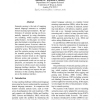Free Online Productivity Tools
i2Speak
i2Symbol
i2OCR
iTex2Img
iWeb2Print
iWeb2Shot
i2Type
iPdf2Split
iPdf2Merge
i2Bopomofo
i2Arabic
i2Style
i2Image
i2PDF
iLatex2Rtf
Sci2ools
121
Voted
ACL
2006
2006
Discriminative Reranking for Semantic Parsing
Semantic parsing is the task of mapping natural language sentences to complete formal meaning representations. The performance of semantic parsing can be potentially improved by using discriminative reranking, which explores arbitrary global features. In this paper, we investigate discriminative reranking upon a baseline semantic parser, SCISSOR, where the composition of meaning representations is guided by syntax. We examine if features used for syntactic parsing can be adapted for semantic parsing by creating similar semantic features based on the mapping between syntax and semantics. We report experimental results on two real applications, an interpreter for coaching instructions in robotic soccer and a naturallanguage database interface. The results show that reranking can improve the performance on the coaching interpreter, but not on the database interface.
Related Content
| Added | 30 Oct 2010 |
| Updated | 30 Oct 2010 |
| Type | Conference |
| Year | 2006 |
| Where | ACL |
| Authors | Ruifang Ge, Raymond J. Mooney |
Comments (0)

